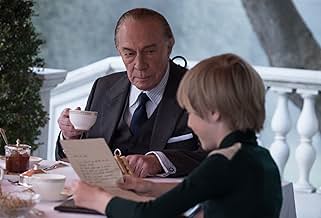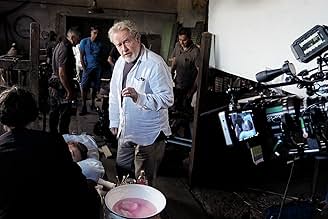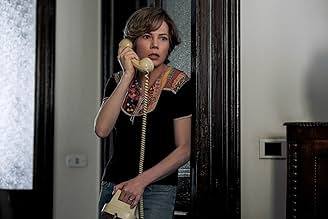A historia deo rapto do John Paul Getty de 16 anos e a tentiva da sua mãe de convencer ao avó de pagar o resgate.A historia deo rapto do John Paul Getty de 16 anos e a tentiva da sua mãe de convencer ao avó de pagar o resgate.A historia deo rapto do John Paul Getty de 16 anos e a tentiva da sua mãe de convencer ao avó de pagar o resgate.
- Direção
- Roteiristas
- Artistas
- Indicado a 1 Oscar
- 15 indicações no total
Andrea Piedimonte Bodini
- Corvo
- (as Andrea Piedimonte)
- Direção
- Roteiristas
- Elenco e equipe completos
- Produção, bilheteria e muito mais no IMDbPro
Avaliações em destaque
Greetings again from the darkness. The grandson of J Paul Getty, the wealthiest man in the world, was kidnapped while in Rome in 1973. That fascinating story holds more than enough drama for an engaging movie, and certainly did not need the notoriety or artistic challenges brought on by the Kevin Spacey scandal. With filming completed and a release date mere weeks away, director Ridley Scott made the decision to erase all evidence of Mr. Spacey's J Paul Getty, and replace him with Oscar winner Christopher Plummer. The "do-over" is nearly seamless and it's not a stretch to believe the second version turned out better than the first.
The precisely descriptive titled 1995 John Pearson book "Painfully Rich: The Outrageous Fortunes and Misfortunes of the Heirs of J Paul Getty" is adapted by screenwriter David Scarpa, and it's the storytelling instincts of Mr. Ridley, and remarkable acting of Mr. Plummer and Michelle Williams that keep us engaged for the 132 minute run time.
16 year old John Paul Getty III is played by rising star Charlie Plummer ("Boardwalk Empire", no relation to Christopher), and though this is the story of his kidnapping and violent torture, the movie mostly focuses on the contrasting personalities of his devoted mother Gail Harris (Michelle Williams) and his miserly grandfather J Paul Getty (Christopher Plummer), the wealthiest man in the world. She is a woman totally committed to her children while spurning the strings attached to family money. He, on the other hand, has devoted his life to money and winning, ignoring anything that might be construed as loyalty or compassion to family. Having just starred as Ebenezer Scrooge in THE MAN WHO INVENTED CHRISTMAS, this is just about the easiest transition an actor could hope for, given so little prep time for a new role.
The billionaire Getty refuses to pay the ransom, instead dispatching his security specialist Fletcher Chase (Mark Wahlberg) to negotiate the boy's release. As a former CIA operative, Chase misreads both the situation with the abductors and the strength and determination of Gail. We get periodic looks at the captors and the environment where the grandson is being held. Romain Duris (THE BEAT THAT MY HEAR SKIPPED) is excellent as Cinquanta, the captor who spends the most time with the boy. The "ear" scene is explicit enough to elicit groans and shrieks from the audience, so be advised.
"We are not like you" is what the younger Getty tells us as narrator, and he's right. The ultra-rich live in a different world than you and I (assuming you aren't one of "them"), and that's never more clear than when the elder Getty explains his preference for things over people. While we never empathize with the rich miser, director Scott at least helps us understand what made him tick. To him, life was a negotiation and it's all about winning - though his definition of winning could be debated.
The two octogenarians, Mr. Scott (80) and Mr. Plummer (88) work wonders with the outstanding Ms. Williams to make this a relatable story and captivating movie. The elder Getty died in 1976, two months to the day after Howard Hughes, while the grandson Getty had a massive drug overdose in 1981, and died in poor health in 2011, leaving behind his son, actor Balthazar Getty.
The precisely descriptive titled 1995 John Pearson book "Painfully Rich: The Outrageous Fortunes and Misfortunes of the Heirs of J Paul Getty" is adapted by screenwriter David Scarpa, and it's the storytelling instincts of Mr. Ridley, and remarkable acting of Mr. Plummer and Michelle Williams that keep us engaged for the 132 minute run time.
16 year old John Paul Getty III is played by rising star Charlie Plummer ("Boardwalk Empire", no relation to Christopher), and though this is the story of his kidnapping and violent torture, the movie mostly focuses on the contrasting personalities of his devoted mother Gail Harris (Michelle Williams) and his miserly grandfather J Paul Getty (Christopher Plummer), the wealthiest man in the world. She is a woman totally committed to her children while spurning the strings attached to family money. He, on the other hand, has devoted his life to money and winning, ignoring anything that might be construed as loyalty or compassion to family. Having just starred as Ebenezer Scrooge in THE MAN WHO INVENTED CHRISTMAS, this is just about the easiest transition an actor could hope for, given so little prep time for a new role.
The billionaire Getty refuses to pay the ransom, instead dispatching his security specialist Fletcher Chase (Mark Wahlberg) to negotiate the boy's release. As a former CIA operative, Chase misreads both the situation with the abductors and the strength and determination of Gail. We get periodic looks at the captors and the environment where the grandson is being held. Romain Duris (THE BEAT THAT MY HEAR SKIPPED) is excellent as Cinquanta, the captor who spends the most time with the boy. The "ear" scene is explicit enough to elicit groans and shrieks from the audience, so be advised.
"We are not like you" is what the younger Getty tells us as narrator, and he's right. The ultra-rich live in a different world than you and I (assuming you aren't one of "them"), and that's never more clear than when the elder Getty explains his preference for things over people. While we never empathize with the rich miser, director Scott at least helps us understand what made him tick. To him, life was a negotiation and it's all about winning - though his definition of winning could be debated.
The two octogenarians, Mr. Scott (80) and Mr. Plummer (88) work wonders with the outstanding Ms. Williams to make this a relatable story and captivating movie. The elder Getty died in 1976, two months to the day after Howard Hughes, while the grandson Getty had a massive drug overdose in 1981, and died in poor health in 2011, leaving behind his son, actor Balthazar Getty.
The true story this film recreates could and should have made a crackling movie, but instead Ridley Scott delivers a serviceable film that hits all of its marks but feels rather bloodless on screen.
As pretty much everyone knows, Christopher Plummer was pulled in at the last minute to play J. Paul Getty, reshooting all of the scenes previously featuring Kevin Spacey in a performance we will now never see thanks to the sexual harassment scandal that emerged about him. Getty refuses to pay the ransom when his grandson is kidnapped, much to the anger and frustration of his ex-daughter-in-law, played by Michelle Williams in a performance that struggles to rise above the middle-brow film making. Mark Wahlberg is Getty's chief security man who's tasked with handling the situation and who eventually sours on Getty as he realizes what a cold-blooded monster he is. All of the performances are fine, but nothing about this movie really ever comes fully to life. Everything we're supposed to feel is telegraphed every step of the way, including the rather obvious moral that a life driven by the acquisition of money and stuff is bound to be an empty one. And the finale, which should be a nail biter, instead is clunky and awkward. Scott's direction in the rest of the film is uninspired but competent; his direction of the film's climax is just bad.
Grade: B-
As pretty much everyone knows, Christopher Plummer was pulled in at the last minute to play J. Paul Getty, reshooting all of the scenes previously featuring Kevin Spacey in a performance we will now never see thanks to the sexual harassment scandal that emerged about him. Getty refuses to pay the ransom when his grandson is kidnapped, much to the anger and frustration of his ex-daughter-in-law, played by Michelle Williams in a performance that struggles to rise above the middle-brow film making. Mark Wahlberg is Getty's chief security man who's tasked with handling the situation and who eventually sours on Getty as he realizes what a cold-blooded monster he is. All of the performances are fine, but nothing about this movie really ever comes fully to life. Everything we're supposed to feel is telegraphed every step of the way, including the rather obvious moral that a life driven by the acquisition of money and stuff is bound to be an empty one. And the finale, which should be a nail biter, instead is clunky and awkward. Scott's direction in the rest of the film is uninspired but competent; his direction of the film's climax is just bad.
Grade: B-
"A Getty is special. A Getty is nobody's friend." J. Paul Getty (Christopher Plummer)
If Ridley Scott's All the Money in the World does anything well, it shows the banality of crime and wealth, at least as this abduction/ransom motif plays out. It's the story inspired by the kidnapping of John Paul Getty III (Charlie Plummer) in 1973, his grandfather's resistance to paying the Italian Red Brigade's ransom demand, and the heroic effort of his mother, Gail Harris (Michelle Williams), to bring her son back alive.
After slogging through the tepid back story (disjointed to say the least), the story gains strength through the passions of its leading players, both of whom have strong feelings about the right way to respond to the kidnappers' demand for $17 million ransom. Mom would pay, considering grandpa is the richest man who ever lived, and he does not in principle want to capitulate.
Yet he may also have reasons to deny the ransom, one that paying would open floodgates of abductions for his other grandchildren and a point made later on but nonetheless fascinating history about the nature of the Getty fortune. Regardless, the central conflict of the story is not the kidnapping but the struggle between patriarch and daughter-in-law for the soul of the family and the deliverance of III.
Although the cross editing between home and kidnappers is sometimes jarring, the director makes the audience feel as if it's present at the contentious proceedings. Trying to understand why the old man resists the ransom is a most difficult situation for parents who couldn't possibly do anything other than pay, but the audience can witness the arguments as if right there among the players.
Coldness pervades this film, as if Scott were able to let the audience feel the lack of warmth from the old man's. Several scenes show him in front of large fireplaces, evoking a Citizen Kane ambience. Getty echoes the self-centered, aloof, lonely Charles Foster Kane.
For the history and the acting, All the Money in the World is worth enjoying this season. Williams plays a resolute and resourceful mother and Plummer infuses the Scrooge-like Getty with a humanity that feels like we are with the real tycoon.
The film is also a cautionary tale about the corruption of wealth and the tenuous familial relations when money is the major player. See it and be happy with your small fortune, which may be, I hope, your loved ones.
If Ridley Scott's All the Money in the World does anything well, it shows the banality of crime and wealth, at least as this abduction/ransom motif plays out. It's the story inspired by the kidnapping of John Paul Getty III (Charlie Plummer) in 1973, his grandfather's resistance to paying the Italian Red Brigade's ransom demand, and the heroic effort of his mother, Gail Harris (Michelle Williams), to bring her son back alive.
After slogging through the tepid back story (disjointed to say the least), the story gains strength through the passions of its leading players, both of whom have strong feelings about the right way to respond to the kidnappers' demand for $17 million ransom. Mom would pay, considering grandpa is the richest man who ever lived, and he does not in principle want to capitulate.
Yet he may also have reasons to deny the ransom, one that paying would open floodgates of abductions for his other grandchildren and a point made later on but nonetheless fascinating history about the nature of the Getty fortune. Regardless, the central conflict of the story is not the kidnapping but the struggle between patriarch and daughter-in-law for the soul of the family and the deliverance of III.
Although the cross editing between home and kidnappers is sometimes jarring, the director makes the audience feel as if it's present at the contentious proceedings. Trying to understand why the old man resists the ransom is a most difficult situation for parents who couldn't possibly do anything other than pay, but the audience can witness the arguments as if right there among the players.
Coldness pervades this film, as if Scott were able to let the audience feel the lack of warmth from the old man's. Several scenes show him in front of large fireplaces, evoking a Citizen Kane ambience. Getty echoes the self-centered, aloof, lonely Charles Foster Kane.
For the history and the acting, All the Money in the World is worth enjoying this season. Williams plays a resolute and resourceful mother and Plummer infuses the Scrooge-like Getty with a humanity that feels like we are with the real tycoon.
The film is also a cautionary tale about the corruption of wealth and the tenuous familial relations when money is the major player. See it and be happy with your small fortune, which may be, I hope, your loved ones.
It's nearly impossible to separate what happened off screen with the final product of All the Money in the World. With that said, Ridley Scott pretty much couldn't have done a better job at making a seamless transition from Kevin Spacey to Christopher Plummer in the role of J. Paul Getty. Inevitably that will be the one thing people always remember about this film, but in the end, the film succeeds elsewhere as a thriller based around the kidnapping of Getty's grandson in Rome in 1973.
Perhaps the most impressive aspect of the film is its non-stop pacing. Whether or not all of the bells and whistles of this story were true, Scott is determined to keep you on the edge of your seat with suspense, even if you ultimately know where the story ends up. And luckily, this story is perfect for a cinematic experience. The true events are unfortunately tragic for many involved, but in the end it's the character of J. Paul Getty that makes for a truly riveting character to watch. Not willing to budge to pay a single dime for his grandson's ransom is beyond frugal, and the fact that the events didn't play out in an even worse manor is a miracle.
Getty's pushback (or lack thereof) makes for a great back and forth with his daughter in law, Gail Harris (played by Michelle Williams). Williams is brilliant in everything, and she once again kills it as the desperate but under control mother of a kidnapped son. She will likely be overshadowed by Plummer come award shows, but Williams' talent will never go unnoticed from me.
Ultimately, All the Money in the World is a fascinating tale of greed, frugality, power, and the differences in people's approach in high stress situations. From great performances to an impressive and important feat from Scott's last minute direction, I quite appreciated All the Money in the World.
7.9/10
Perhaps the most impressive aspect of the film is its non-stop pacing. Whether or not all of the bells and whistles of this story were true, Scott is determined to keep you on the edge of your seat with suspense, even if you ultimately know where the story ends up. And luckily, this story is perfect for a cinematic experience. The true events are unfortunately tragic for many involved, but in the end it's the character of J. Paul Getty that makes for a truly riveting character to watch. Not willing to budge to pay a single dime for his grandson's ransom is beyond frugal, and the fact that the events didn't play out in an even worse manor is a miracle.
Getty's pushback (or lack thereof) makes for a great back and forth with his daughter in law, Gail Harris (played by Michelle Williams). Williams is brilliant in everything, and she once again kills it as the desperate but under control mother of a kidnapped son. She will likely be overshadowed by Plummer come award shows, but Williams' talent will never go unnoticed from me.
Ultimately, All the Money in the World is a fascinating tale of greed, frugality, power, and the differences in people's approach in high stress situations. From great performances to an impressive and important feat from Scott's last minute direction, I quite appreciated All the Money in the World.
7.9/10
A wealthy oil man's grandson is kidnapped. His son is a broke and gave nothing to his wife in the divorce. Years later the divorced couples son is kidnapped in Rome but evidence points that the boy n may have staged his own kidnapping.
The acting in this is great. The film however seems to go on 2way to long and most viewers who see this at home will be able to hit the "Fast Forward Button"
Worth watching but if you have a limited attention span then skip it
The acting in this is great. The film however seems to go on 2way to long and most viewers who see this at home will be able to hit the "Fast Forward Button"
Worth watching but if you have a limited attention span then skip it
Você sabia?
- CuriosidadesThe re-shoots needed to replace Kevin Spacey with Christopher Plummer took eight days to film at a cost of $10 million. It also involved Mark Wahlberg and Michelle Williams having to return to the Rome set during the Thanksgiving holiday of 2017.
- Erros de gravaçãoWhen Gail and Fletcher drive past the autostrada tollgates, modern commercial vehicles are visible in the background.
- Citações
J. Paul Getty: There's a purity to beautiful things that I've never been able to find in another human being.
- ConexõesEdited from Falcão Negro em Perigo (2001)
- Trilhas sonorasBelinda
Written by Chris Andrews
Performed by Gianni Morandi
Courtesy of Sony BMG Entertainment (Italy) S.p.A
Principais escolhas
Faça login para avaliar e ver a lista de recomendações personalizadas
- How long is All the Money in the World?Fornecido pela Alexa
Detalhes
- Data de lançamento
- Países de origem
- Centrais de atendimento oficiais
- Idiomas
- Também conhecido como
- Todo el dinero del mundo
- Locações de filme
- Empresas de produção
- Consulte mais créditos da empresa na IMDbPro
Bilheteria
- Orçamento
- US$ 50.000.000 (estimativa)
- Faturamento bruto nos EUA e Canadá
- US$ 25.113.707
- Fim de semana de estreia nos EUA e Canadá
- US$ 5.584.684
- 31 de dez. de 2017
- Faturamento bruto mundial
- US$ 56.996.304
- Tempo de duração2 horas 12 minutos
- Cor
- Mixagem de som
- Proporção
- 2.39 : 1
Contribua para esta página
Sugerir uma alteração ou adicionar conteúdo ausente








































